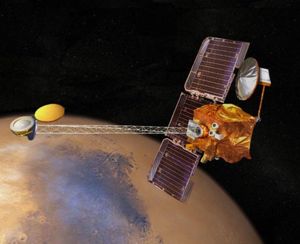Difference between revisions of "Mars Odyssey"
m (Undo revision 7826 by 89.221.163.75 (Talk) remove vandalism) |
|||
| Line 12: | Line 12: | ||
* Chloride salts<ref>[http://www.newscientist.com/article/dn13506-chloride-salts-on-mars-may-have-preserved-past-life.html New Scientist: Chloride salts on Mars may have preserved past life]</ref><ref>[http://news.bbc.co.uk/1/hi/sci/tech/7302591.stm BBC: Mars is 'covered in table salt']</ref> | * Chloride salts<ref>[http://www.newscientist.com/article/dn13506-chloride-salts-on-mars-may-have-preserved-past-life.html New Scientist: Chloride salts on Mars may have preserved past life]</ref><ref>[http://news.bbc.co.uk/1/hi/sci/tech/7302591.stm BBC: Mars is 'covered in table salt']</ref> | ||
| − | + | ==Open issues== | |
| + | What are the exact data? | ||
==References== | ==References== | ||
Revision as of 23:03, 4 December 2012
| This article is a stub. You can help Marspedia by expanding it. |
- "2001 Mars Odyssey is part of NASA's Mars Exploration Program, a long-term effort of robotic exploration of the red planet. The opportunity to go to Mars comes around every 26 months, when the alignment of Earth and Mars in their orbits around the sun allows spacecraft to travel between the two planets with the least amount of energy. 2001 Mars Odyssey launched on April 7, 2001, and arrived at Mars on October 24, 2001, 0230 Universal Time (October 23, 7:30 pm PDT/ 10:30 EDT)." - Mission website.
Results
The orbiter recorded and transmitted data about concentration and distribution of hydrogen and other chemicals of the Martian surface. Additionally, the radiation conditions were measured, covering ultra violet and gamma.
Found substances
Open issues
What are the exact data?







